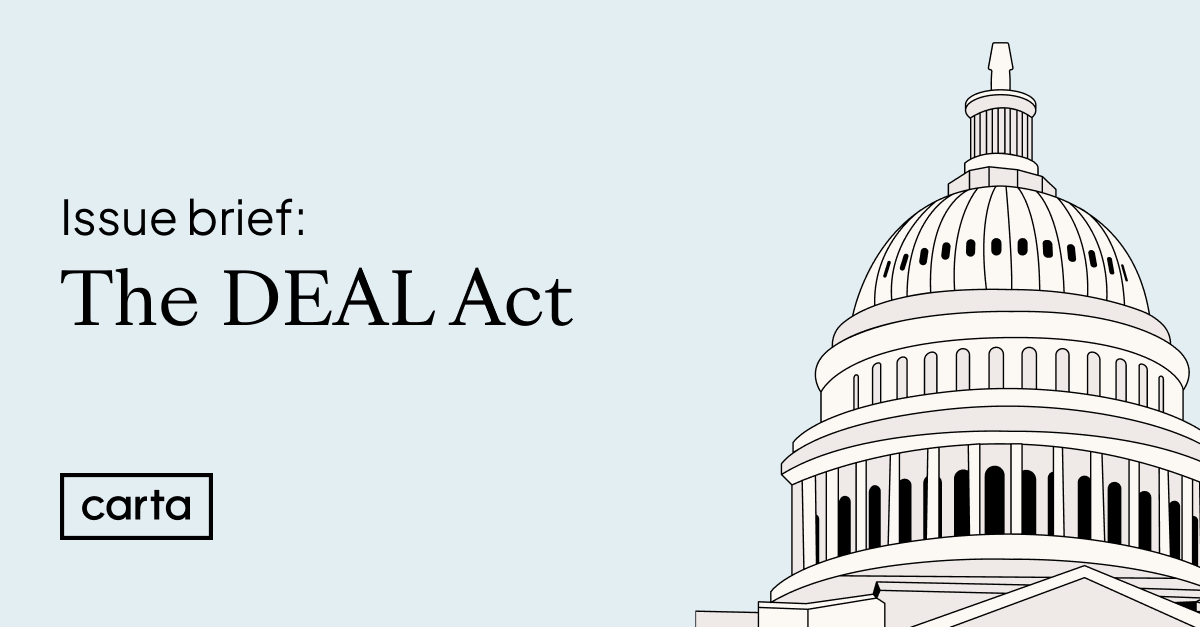Expanding qualifying venture capital investments
To qualify for exemption from SEC registration under the venture capital exemption, venture capital fund managers must allocate the majority of their portfolio to direct investments in private companies, while limiting their acquisitions of private assets through secondary sales and investments in other funds or special purpose vehicles. These limits constrain the sector’s ability to support innovative, high-growth companies. By restricting demand for portfolio company equity sold in secondary sales, the limitations also make it harder for private companies to reward employees by giving them opportunities to sell their equity holdings in company-sponsored liquidity events.
The DEAL Act will lift some of these restrictions by expanding the universe of qualifying investments, which will help drive more capital into the ecosystem in more regions.
How it works: To stimulate innovation and job creation, Congress created regulatory exemptions that allow venture capital fund advisers to operate with more tailored regulation than SEC-registered fund advisers. To qualify for the venture capital fund adviser exemption a fund manager can only manage venture capital funds that meet certain regulatory requirements.
This regulatory definition of a venture capital fund makes several stipulations; one of these states that a venture capital fund may not invest more than 20% of its assets under management in non-qualifying investments. Qualifying investments are generally direct investments in qualifying portfolio companies. Secondaries and fund-of-fund investments are considered non-qualifying investments simply because the assets obtained through such transactions are not acquired directly from a qualifying private company.
Why it matters: Secondary sales support greater private-market liquidity, which reduces risk in private-sector investment and helps employees realize the value of their equity compensation. In the VC sector, fund-of-fund structures have become a vital mechanism for supporting emerging managers and developing industries by providing anchor funding to the first-time fund managers and specialty funds that support emergent ecosystems and technologies.
Background
Fund-of-fund investments
By definition and design, the venture-backed innovation economy evolves quickly. New sectors, geographies, and technologies arise—and new venture managers step in to capitalize on them. These segments of venture investment may pose a higher risk for being untested, but they often present higher potential upside, along with early access to nascent technologies and strategies.
LPs often wish to gain exposure to these segments, but they lack the knowledge or network for investing in them. Another barrier is check size: institutional LPs and qualified purchasers often have a minimum check size that emerging managers and sectors cannot accommodate. Finally, some LPs are ready to gain exposure to higher-risk, proof-of-concept funds, but wish to mitigate against the higher risk by taking an indexed approach to fund investment.
This is where a fund-of-funds (FoF) model comes in: Rather than invest in smaller, specialized funds, LPs can invest in a FoF vehicle that pools a larger amount of capital and divides it strategically between funds in emerging segments and funds with more traditional investment theses. The FoF model thus offers a crucial tool for de-risking new asset classes or investment categories that may offer superior returns.
Disqualifying the underlying assets may provide protection from risk for certain investors, but it constrains innovation and limits potential upside for investors in the short run, which could negatively impact categories or managers that may become mainstream in the future.
Secondary transactions
Secondary sales have become increasingly commonplace in the private markets. As the venture-backed innovation economy matured, private companies began to display a preference for remaining private for longer. This allows them to continue making long-tail bets on innovative projects without the pressures of quarterly earnings reports to shareholders.
These longer timelines to exit support innovation. But they can also prevent employees from cashing in the value of their equity compensation. This is one reason companies have turned to secondary markets in increasing numbers. Likewise, secondary sales allow investors who wish to exit their positions in a private company to recycle capital by selling their shares to other investors. Secondary sales thus makes the private markets less risky by increasing opportunities for liquidity. But these opportunities remain artificially limited by the classification of assets acquired in a secondary sale as non-qualifying investments.
Potential changes: The DEAL Act
The Developing and Empowering our Aspiring Leaders Act of 2022, also known as the DEAL Act, is a short piece of legislation with two simple clauses for expanding the criteria for a qualifying venture capital investment. The DEAL Act would:
-
Classify a fund’s investment in a qualifying portfolio company, regardless of whether it is acquired through a secondary transaction or directly from the company, as a qualifying investment, so long as most of the fund’s qualifying investments are composed of direct investments in portfolio companies
-
Classify venture capital fund investments in other venture capital funds as qualifying investments
Bottom line
If the underlying assets in a secondary sale or fund-of-funds investment would qualify as venture investments in a traditional venture financing, the same assets should not be disqualified based on the method of their acquisition.
Expanding the definition of qualifying venture investments to include secondary sale and fund-of-fund investments will enable early employees and investors to realize their gains and recycle capital, as well as drive capital to more emerging fund managers operating in developing sectors and regions.
Get involved
Stay up to date by subscribing to Carta’s Policy Weekly newsletter.
To learn more about how to get involved in Carta’s work to create public policy for tomorrow’s innovation economy, write us here.

